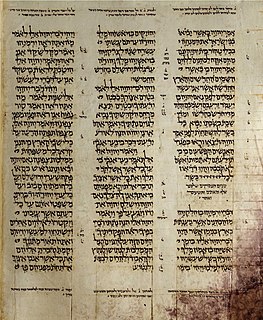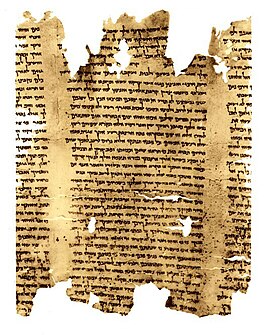
Jeremiah 1 is the first chapter of the Book of Jeremiah in the Hebrew Bible or the Old Testament of the Christian Bible. This book, one of the Nevi'im or Books of the Prophets, contains the prophecies attributed to the prophet Jeremiah. This chapter serves as an introduction to the Book of Jeremiah and relates Jeremiah's calling as a prophet.
Isaiah 49 is the forty-ninth chapter of the Book of Isaiah in the Hebrew Bible or the Old Testament of the Christian Bible. This book contains the prophecies attributed to the prophet Isaiah, and is one of the Books of the Prophets. Chapters 40-55 are known as "Deutero-Isaiah" and date from the time of the Israelites' exile in Babylon. This chapter includes the second of the songs of the "Suffering Servant".
Isaiah 42 is the forty-second chapter of the Book of Isaiah in both the Hebrew Bible and the Old Testament of the Christian Bible. This book contains the prophecies attributed to the prophet Isaiah, and is a part of the Books of the Prophets. Chapters 40-55 are known as "Deutero-Isaiah" and date from the time of the Israelites' exile in Babylon. This chapter contains a poem known as the first of the "Servant songs" about the servant, whom Jewish tradition holds that Isaiah identifies as either the Israelites themselves or Cyrus.
Isaiah 2 is the second chapter of the Book of Isaiah in the Hebrew Bible or the Old Testament of the Christian Bible. This book contains the prophecies attributed to the prophet Isaiah, and is one of the Books of the Prophets.
Isaiah 17 is the seventeenth chapter of the Book of Isaiah in the Hebrew Bible or the Old Testament of the Christian Bible. This book contains the prophecies attributed to the prophet Isaiah, and is one of the Books of the Prophets. The New King James Version describes this chapter as a "proclamation against Syria and Israel".
Isaiah 26 is the twenty-sixth chapter of the Book of Isaiah in the Hebrew Bible or the Old Testament of the Christian Bible. This book contains the prophecies attributed to the prophet Isaiah, and is one of the Books of the Prophets. Chapters 24-27 of Isaiah constitute one continuous poetical prophecy, sometimes called the "Isaiah Apocalypse".
Isaiah 32 is the thirty-second chapter of the Book of Isaiah in the Hebrew Bible or the Old Testament of the Christian Bible. This book contains the prophecies attributed to the prophet Isaiah, and is one of the Book of the Prophets. The Jerusalem Bible groups chapters 28-35 together as a collection of "poems on Israel and Judah". Unlike the previous chapters, this chapter makes no reference to "the overthrow of the Assyrians".
Isaiah 35 is the thirty-fifth chapter of the Book of Isaiah in the Hebrew Bible or the Old Testament of the Christian Bible. This book contains the prophecies attributed to the prophet Isaiah, and is one of the Books of the Prophets. This is the final chapter in a group which the Jerusalem Bible calls a collection of "poems on Israel and Judah". The New King James Version entitles this chapter "The Future Glory of Zion".
Isaiah 44 is the forty-fourth chapter of the Book of Isaiah in the Hebrew Bible or the Old Testament of the Christian Bible. This book contains the prophecies attributed to the prophet Isaiah, and is a part of the Books of the Prophets.
Isaiah 54 is the fifty-fourth chapter of the Book of Isaiah in the Hebrew Bible or the Old Testament of the Christian Bible. This book contains the prophecies attributed to the prophet Isaiah, and is one of the Books of the Prophets. Chapters 40-55 are known as "Deutero-Isaiah" and date from the time of the Israelites' exile in Babylon.
Isaiah 56 is the fifty-sixth chapter of the Book of Isaiah in the Hebrew Bible or the Old Testament of the Christian Bible. This book contains the prophecies attributed to the prophet Isaiah, and is one of the Books of the Prophets. Chapter 56 is the first chapter of the final section of the Book of Isaiah, often referred to as Trito-Isaiah.

Isaiah 57 is the fifty-seventh chapter of the Book of Isaiah in the Hebrew Bible or the Old Testament of the Christian Bible. This book contains the prophecies attributed to the prophet Isaiah, and is one of the Books of the Prophets. Chapter 57 is the second chapter of the final section of the Book of Isaiah, often referred to as Trito-Isaiah.

Isaiah 58 is the fifty-eighth chapter of the Book of Isaiah in the Hebrew Bible or the Old Testament of the Christian Bible. This book contains the prophecies attributed to the prophet Isaiah, and is one of the Books of the Prophets. Chapters 56-66 are often referred to as Trito-Isaiah. This chapter contains a proclamation regarding "fasting that pleases God".
Isaiah 61 is the sixty-first chapter of the Book of Isaiah in the Hebrew Bible or the Old Testament of the Christian Bible. This book contains the prophecies attributed to the prophet Isaiah, and is one of the Books of the Prophets. Chapters 56-66 are often referred to as Trito-Isaiah. In chapters 60–62, "three magnificent chapters", the prophet "hails the rising sun of Jerusalem’s prosperity". According to Luke 4:17, Jesus, visiting the synagogue at Nazareth, was handed "the book of the prophet Isaiah" and "found the place" where the opening verses of this chapter were written. The New King James Version sub-titles this chapter "The Good News of Salvation".
Isaiah 64 is the sixty-fourth chapter of the Book of Isaiah in the Hebrew Bible or the Old Testament of the Christian Bible. This book contains the prophecies attributed to the prophet Isaiah, and is one of the Books of the Prophets. Chapters 56-66 are often referred to as Trito-Isaiah. This chapter contains "a prayer for help" in a format which T. K. Cheyne describes as "a liturgical psalm".
Isaiah 65 is the sixty-fifth chapter of the Book of Isaiah in the Hebrew Bible or the Old Testament of the Christian Bible. This book contains the prophecies attributed to the prophet Isaiah, and is one of the Book of the Prophets. Chapters 56-66 are often referred to as Trito-Isaiah. According the Christian exegesis, this chapter refers to the vocation of the gentiles.

Jeremiah 4 is the fourth chapter of the Book of Jeremiah in the Hebrew Bible or the Old Testament of the Christian Bible. This book contains prophecies attributed to the prophet Jeremiah, and is one of the Books of the Prophets. Chapters 2 to 6 contain the earliest preaching of Jeremiah on the apostasy of Israel.

Jeremiah 5 is the fifth chapter of the Book of Jeremiah in the Hebrew Bible or the Old Testament of the Christian Bible. This book contains prophecies attributed to the prophet Jeremiah, and is one of the Books of the Prophets. Chapters 2 to 6 contain the earliest preaching of Jeremiah on the apostasy of Israel. This chapter is sub-titled "The Justice of God’s Judgment" in the New King James Version.

Jeremiah 16 is the sixteenth chapter of the Book of Jeremiah in the Hebrew Bible or the Old Testament of the Christian Bible. This book contains prophecies attributed to the prophet Jeremiah, and is one of the Books of the Prophets. In the first part of this chapter, Jeremiah is instructed to adopt a lifestyle which will serve as a "symbolic enactment of God's word", comparable to the instructions given to other prophets: see Hosea 1:2–9, Isaiah 8:3–4 and Ezekiel 24:15–24.

Jeremiah 48 is the forty-eighth chapter of the Book of Jeremiah in the Hebrew Bible or the Old Testament of the Christian Bible. This book contains prophecies attributed to the prophet Jeremiah, and is one of the Books of the Prophets. This chapter is part of a series of "oracles against foreign nations", consisting of chapters 46 to 51. In particular, chapters 46-49 focus on Judah's neighbors. This chapter contains the poetic oracles against Moab.





